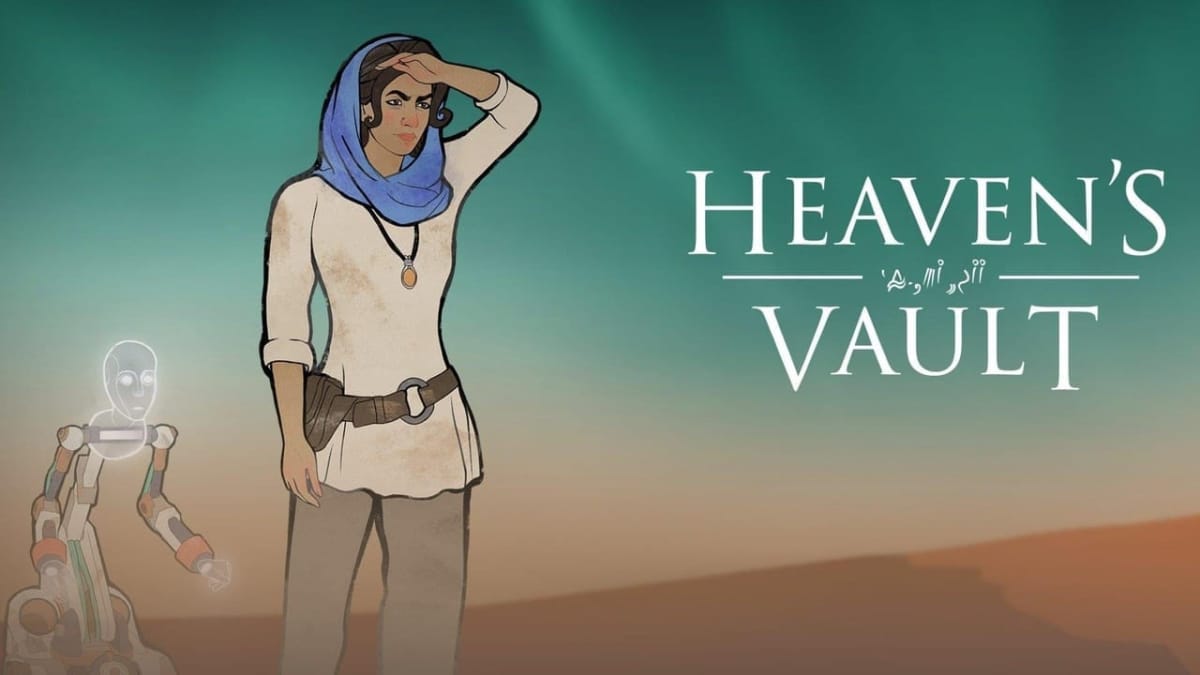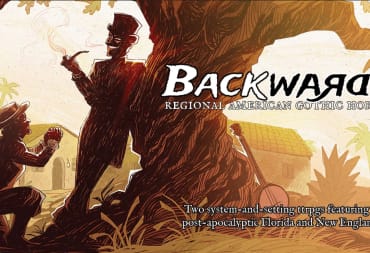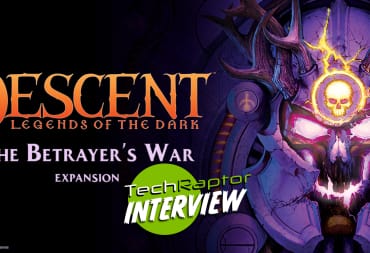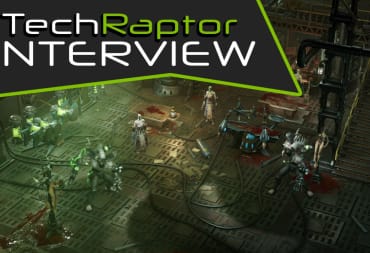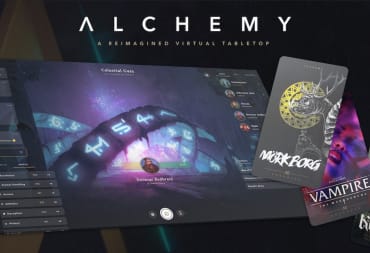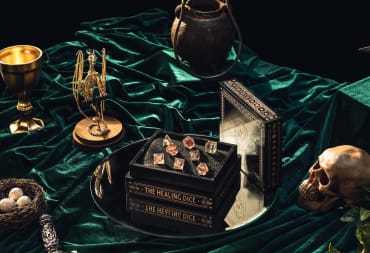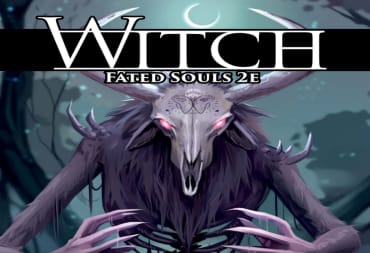I have a love for some adventure gaming. Because of this, Heaven's Vault caught my eye. I got a chance to play the game and found it quite worth my time. However, I wanted to know more about this language adventure. Thankfully, I was able to talk to Joseph Humfrey, one of the co-founders of developer Inkle. I got to talk about their past games, working on Heaven's Vault, how the language was created, and even about the possibility of a Monopoly spin-off. So strap in for another round of Sam Speaks.
TechRaptor: Hello Joseph, and thank you for taking the time to talk with me.
Joseph Humfrey: No worries, it's a pleasure.
TechRaptor: Awesome. So why don't you tell me, since you're one of the co-founders, why don't you tell me how Inkle started?
Joseph: Oh, wow. So yeah, the story of how the band got together. So John Ingold and I worked at Sony, and I think when I first arrived at Sony I sat down next to him and we just sort of immediately hit it off. We were always talking about narrative games and we were thinking about making prototypes and stuff because, I think it was around the time that Heavy Rain had come out and we were just talking about how you could make more interesting and extremely flexible, extremely adaptive dynamic conversations that didn't feel quite so staged.
So all the way back during that time when we first met we were already, you know, in the first week of meeting each other, having ideas. Then, two years later, after my stint at Sony, we decided to find Inkle together. We actually started by creating interactive books, because we were excited about the idea of bringing the idea of interactive fiction to people who normally just read books. So we were originally talking to book publishers about bringing our technology and our skill in writing and our experience in producing beautiful, interactive experiences, to the book industry.
It turned out that didn't go so well because people who liked to read conventional fiction don't like to have choices in their narrative. It's funny because, in some ways what we started in doing with creating these interactive books, it's really not so different to what we're doing now. In fact our narrative technology, Ink, our scripting language that we use in all of our projects, is exactly the same. It's evolved, but the basic idea of it has remained all the way through for the past... this would be game four. I think it's seven or seven and a half years?
That's been a kind of constant throughout the company, even as we moved out of the literary book industry and moved more back into the conventional game space, where we found the audience was much more receptive to innovation and experimentation, because games as a medium is such a broad, wide, medium with so many different sorts of facets in terms of the audience you can make games for, which is great. So we're sort of happy to be back here and make gamey-games, I guess.
TechRaptor: Your guys' first project, you mentioned the interactive books, the first one that I can see is an interactive version of Frankenstein. Why did you decide to start with Frankenstein?
Joseph: So the very first project, yeah it was Frankenstein, and what happened is that as we were kind of showing our interactive book technology, which is mainly Ink, when we were showing it around to different book publishers there was one publisher in particular who had just met up with a gamebook author, Dave Morris, who's extremely well know in that particular small niche of gamebooks. He had written some really well respected gamebooks back in the 80's and 90's I think it was. He'd actually also been pitching the idea of interactive books to the publisher, which was Profile Books.
It just seemed such a good opportunity, from the publisher's point of view, to bring these two parties together. The author who has experience writing interactive fiction through gamebooks, and us who have this new technology that we wanted to demonstrate. Frankenstein actually came from Dave Morris, and we provided the means for him to write it, and the presentation and the design behind it.
TechRaptor: After that, you guys got with Steve Jackson and the Sorcery! gamebooks. How did that come about?
Joseph: Around that time we were always looking for opportunities to find new projects to use our interactive technology with, and my co-founder, John Ingold, being a huge fan of the Sorcery! series, and of Steve Jackson, as a kid, he spent hours and hours with the Sorcery! series, and he knew them inside out. I think we knew Steve just through a friend of a friend. We met up with him.
What was sort of amazing about the opportunity was that he let us go wild with the license. He wasn't one of these over-protective IP holders who had to look at every single word of the script and quibble over every single detail. He said "yeah, just go crazy" and basically just allowed us to reinvent it. We actually took this even further throughout the series. So like Book 1 was quite close to the original gamebook, by the time we got to Book 4 John was basically just using the spirit of the book and the basic plot beats, and every word from the original book is in there somewhere, but he wrote so much extra stuff around it that it kind of came alive as a whole new experience that followed the general tone of the world and followed plot beats, but was a whole new thing.
I think it was a sign we succeeded simply when the biggest fans of the original books didn't really notice, even though we changed so much about it. It fit their memory of what the gamebooks were when they read it two or three decades ago.
TechRaptor: Have you guys considered doing this with any of Steve Jackson's other books?
Joseph: So I guess we've been increasingly keen on creating our own IP, so I guess while doing the Sorcery! series, or at least half way through, we've already done a lot of Sorcery! at this point and we wanted to try other genres. So that's why we were excited about the idea of doing Around the World in Eighty Days, that was the foundation for 80 Days which we did as well. I guess after that we've always been more excited about other things.
With Heaven's Vault now it was the opportunity to create our own completely brand new IP that would be fully owned by ourselves. So the idea of doing more Fighting Fantasy or doing more Steve Jackson gamebooks... I guess we've always just had slightly higher priorities. We loved working on the Sorcery! series, but we're always itching to do something new and a little different and not stay doing the same thing for too long.
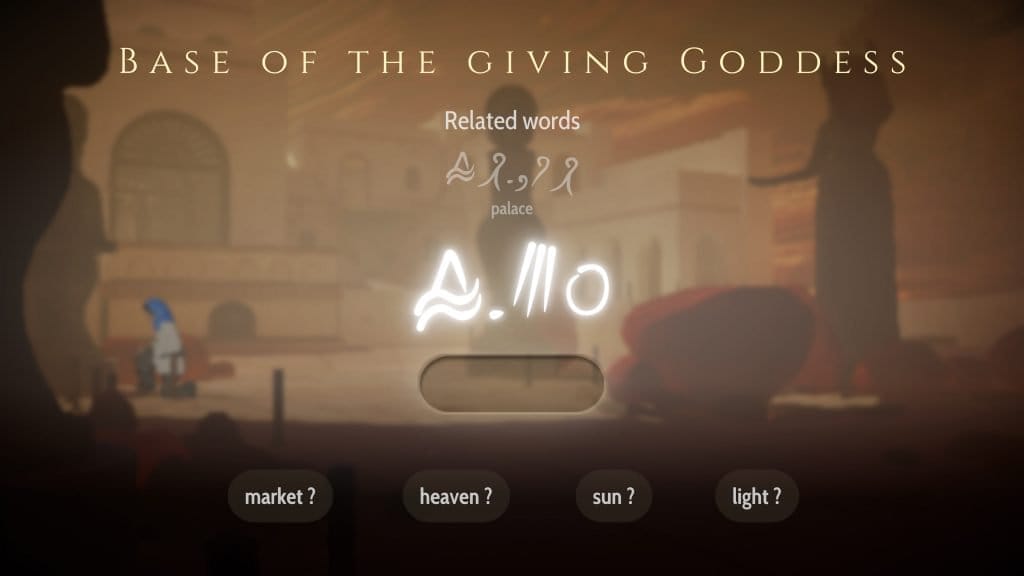
TechRaptor: Around the World in Eighty Days certainly seems like a strange thing to adapt to a game. How did you guys go about doing that?
Joseph: The process of choosing Around the World in Eighty Days as a book to adapt, we've been thinking of it in the back of our mind since Frankenstein. What other literally classics are there that would work? Certainly Jules Verne, as an author, seemed like he would be right for adaptation simply because his books are about... they're a very primordial version of science fiction and they're full of adventure. Of course, being an IP that's over a century old, they're also freely available to adapt.
As we were getting started as a company we didn't have the financial backing to go out and buy a license from Disney or something. It was a good opportunity for us to make use of a license that was really rich and interesting.
We also considered lots of other books. We had considered Twenty Thousand Leagues Under the Sea. I read it, I found it was about 50% descriptions of all sorts of different parts of fish, though I did enjoy it. We did consider Moby Dick. There was something about Eighty Days that we just kept coming back to it. Part of it was that... it's almost like it's got a game objective in the title, Eighty Days, it has a numerical score you've got to hit. We just love the idea of this game mechanic kind of built in. It's already a race, its already got something you can play with. It's not purely just a narrative you're adapting and trying to find ways to fit game mechanics into it. It's was a hugely challenging design to solve, but it also gave a lot for free. Just down to the title of it, for most titles of games we've discussed, it's huge amounts of effort, especially for a band new IP, to come up with a name that's catchy and works really well.
80 Days. It's like we both just independently thought "lets just shorten it down to 80 Days to make it snappy" and we both agreed. It just came together so easily from that point of view. So yeah, there was just lots of things going for it.
TechRaptor: I noticed all of these games are available on PC, but they were originally made as mobile games. Would you say it's targeting that market, especially with what is essentially a premium experience?
Joseph: I think around the time we got started there was this kind of feeling that iOS was this really up and coming new and exciting platform to be on. I think, in some ways, we're really lucky we did release Sorcery! and 80 Days right within this window of excitement, when there were lots of players interested in seeing what the platform has to offer. There's a lot of people who bought iOS devices because there was an exciting new gadget to play with, and they wanted to spend money on it because they wanted to see what they could do with it.
While that's still true to an extent, I think that level of hype has slightly died down now and, you know, there are a lot more of these more cynical free to play experiences and it's a lot more difficult to get noticed. We definitely noticed ourselves that a lot of the gaming websites, or technology websites, they're not so interested in covering mobile titles. Right at the beginning I think that some of these websites saw mobile games as something up and coming. I remember they would devote sections to them. As they went on we'd find increasingly that websites weren't willing to review games.
I remember with IGN in particular, they gave us an award, but they had to write a review within a week before announcing this award, I think it was top games of the year or something, because they realized they hadn't actually written a review for the game even though they wanted to give us an award. I don't blame those websites, I just think that people aren't interested in reading a review for a $5 game. It's more of an instinctive impulse purchase.
So yeah, the space is definitely difficult, especially with the new App Store. I think its been quite challenge for us now, probably why we're looking at other platforms. We're still really interested in mobile, and we're planning on looking at new games coming out in mobile in the future as well.
TechRaptor: Now you guys get to Heaven's Vault, which is your next game that I was very lucky to get to play a preview of. Since this is your first game that's a wholly original setting rather than being based off of a book, was there any challenges in making that that you guys didn't expect?
Joseph: Absolutely. Creating a new IP is extraordinarily difficult. I think, when you have a book to work from, you have this tonal touchstone you can base all your decisions on and that you can be inspired by, but when you start with a completely blank slate you've got to just start off filling with ideas. It sounds really exciting, but actually it's just a huge amount of work and there's just questions at absolutely every turn.
We certainly are over that hump now that we're getting kind of close to release, so we're absolutely elated that we decided to do it. It's so exciting to see the game out there, see our protagonist, and take step back and go "we created this." Just comes directly out of our minds, and we created something from nothing. It's a really fantastic feeling.
The challenges are just that every single little thing you create you have to make decisions about. You don't get anything for free. I think that, more than anything else, is the difficulty of creating a new IP.
TechRaptor: One of the big features of Heaven's Vault is that there's basically a fictional language in the game, you're constantly translating it. How much work went into making that language?
Joseph: I think it's the most difficult thing we've ever designed. I think partially because it's just so unlike anything else. Usually when we're designing something you can reference some one or some other game that created something similar. See how they solved certain problems in game design and take influence from that. This is almost unlike anything we've ever done before.
In the past I've noticed that we like to create game mechanics that have a kind of softness to it, that aren't necessarily hard wins or hard loses, and this is probably the best example of this. It's a puzzle game, but unlike most puzzles it's not a puzzle where you can be absolutely right or absolutely wrong. It's more that it says "have a go, see what you can do." You make your best attempt, and the game will react to whatever you've done based on that. It will change the narrative depending on what you choose, even if you're wrong.
That's the kind of thing I don't think I've ever seen in a game before, so it's a kind of thing that's extremely difficult to design. That went through so many different iterations in order to get there as well. I think the moment where we realized we cracked it was when we had a version of our translation prototype in isolation outside of the game, it was almost just based on pen and paper, and my co-founder John gave me a puzzle to try to solve, and I just noticed myself making the same deductions that I do when I'm looking at a word in German, because I've been learning German in my free time. I just noticed when you put certain words together, or certain parts of words together, you notice there's a similarity between two different words and you make that connection.
You don't have this perfect idea in your mind of exactly what the solution is like you might in a game like The Witness. It's not like it's definitely correct or definitely not correct. You sort of have this much more fuzzy analogue idea in your mind that this word feels like it might have something to do with the sky, or something to do with something big or something with lots of something involved. It's these woolly ideas that, when you pull them together, that helps you make a solution, but you're never quite sure. I love that feeling, because it really did replicate the same feeling that I had when learning real human languages.
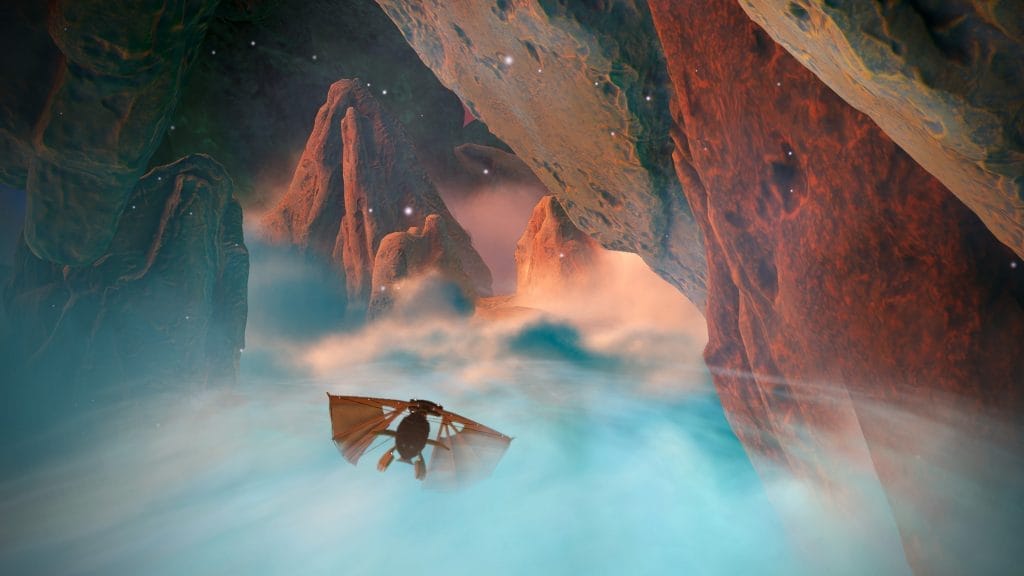
TechRaptor: There's something else noticeable about Heaven's Vault: it has this extremely striking art style. Basically everything looking... I guess the best way to describe it is that it looks like moving concept art. What went into designing that?
Joseph: It's interesting that you say it looks like moving concept art because that's, in some ways, that's the high level of what I've always hoped to achieve with an art direction. There's a few people, art directors and creative directors, who've said they strive to make their game look like a piece of art that you want to hang on your wall every time you look at it. I think the guys behind Monument Valley said that. I also strived for 80 Days, to make it look like every screenshot is sort of an art deco travel poster.
It's the same with Heaven's Vault. Back where we started from was this idea that we'd create an interactive graphic novel. So we started with the idea that we wanted to create something that's much more two dimensional. So we'd have hand drawn 2D characters and we'd have 3D backgrounds, but the only reason we want to create them in 3D is just purely so that we could set up all of these dynamic camera shots to create these comic book panels that would be automatically generated by the game.
As we constructed these worlds in 3D, and put the 2D characters within in them, we noticed that, because we've drawn the characters from every single possible angle, that it was just so much fun and we loved the aesthetics of moving this 3D camera around this hand drawn 2D character. Then we just decided to make that the game. It had so many other great affordances that obviously as soon as you go from 2D to 3D you get this much more raw sense of exploration, being able to look into all the dusty corners of a room and move around. Which, kind of really meshes well with the archeology theme.
So yeah, it was a very evolutionary process, which I think is the kind of techniques that we used to define the art direction in all of our games, and the way we build all of our games. The way we build all of our games is we just try something, we evolve it, and we take it further and further.
But yeah, the fact that it almost looks like concept art is something I really love. Another of our touchstones was just kind of cartoons from... you know, early cartoons. Whether it's by Disney or by other creators, where you have these beautifully hand-pained watercolor backgrounds that are really soft and smooth, then you have these sharp characters animating over the top, and you would think that they wouldn't work tell together, but there's something about it and the way they composed them that they actually worked really beautifully. That's something that we've tried to do as well. Having these hard outlined character but having quite a soft background style, and then use techniques like real-time shadows that make the characters really look like they're sitting within in the world.
TechRaptor: By chance, since this is a story-heavy game, do you know how many words are in the script?
Joseph: That's a very good question, I haven't checked it in a long time. I would guess that it's somewhere in the region of 200,000, but I would have to double check that. That's based on the size of the file. I know that our story data is of a similar size to some of our Sorcery! games, but in many ways it's a different kind of date because, where as Sorcery! and 80 Days contained a lot of prose, Heaven's Vault is a lot more dynamic, and the ratio between actual written content and the kind of programming instructions on how to stick those together and weave around and pulling different content from different sources. There's a lot more of that in Heaven's Vault in order to make it all react to player responses. But I'd say it's somewhere in the region of 100,000 to 200,000 words right now.
TechRaptor: Since you guys have, mostly up until this point, video game adaptions of books, do you think it would be interesting to have a book adaption of Heaven's Vault?
Joseph: Especially towards the end of the project, when we can really see if coming together and we feel the music coming in and finally we're able to play through it as one finished piece. It's funny how you can, with your head right down close to it, you sort of forget about what you're making. It's only when you're finished and you can stand back and look at it that suddenly you get excited by what we've produced as a team, and definitely this is the point, right now, at the end of the project where we suddenly get our inspiration back. When we kind of look at it and go "this would be brilliant." Whether it's a book, I would love to see a novel written in the world, or definitely a film or TV series. We're so excited about the world that we now have, and the protagonist-- we've just fallen in love with our protagonist.
It's strange, having been working on this for three or four years now, although we've become very close to it and we're almost sick of seeing it, at the same time, now that it's almost finished, we're seeing it in fresh eyes, almost like someone buying the game for the first time. So yeah, we're really excited about what spin-offs can be made from it. Although we don't have any concrete plans just yet.
TechRaptor: So you don't have plants for a Heaven's Vault Monopoly Board?
Joseph: [Laughter.] That would be amazing. Yeah, I want Heaven's Vault everything.
TechRaptor: Fair. Speaking of the world, one of the things I've noticed is that there's a really interesting half medieval, half sci-fi thing going on. How did you guys come to that style?
Joseph: Again, I think it's basically been a really evolutionary process for us. Its been sort of an instinctive thing that, although we wanted it to be sci-fi, anytime we designed any individual little component, whether it was giving feedback to the concept artist we worked with for developing the original protagonist, Aliya. Every time they'd do this classic sci-fi tropes, like giving her extra goggles or knee pads or really aggressive looking military boots like Lara Croft has, we would push back on that. What we ended up with was a world that was a lot softer and less kind of sharp shiny metal that you see in traditional sci-fi.
So that was kind of the evolutionary part, but then also there was a point about halfway through the project that we realized what we were creating was more of a fantasy game in many ways in terms of the tone of it than it was a sci-fi game. That's been kind of the way that led to all of our aesthetic decisions about the way the game should feel and the way the game should look as we've gone through. We prefer to think of it now as more like a fantasy game that just happens to have bits of sci-fi in it.
But yeah, we love that blurring of the lines between what you think of as classic sci-fi and fantasy. There's a few games that have done that. You see a little bit of it in things like Stargate. We wanted to do something different from Stargate, but that was definitely a strong inspiration for us.
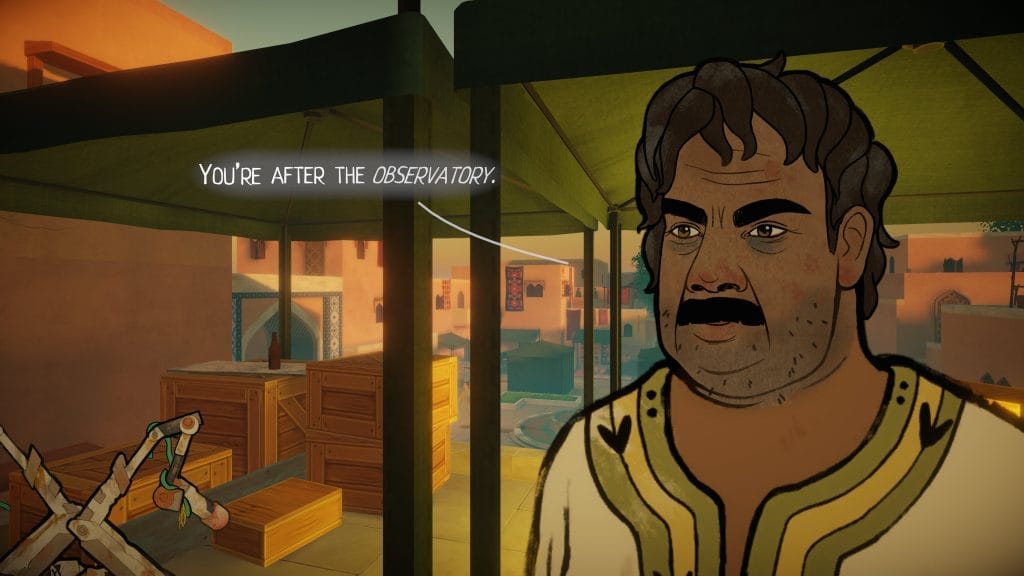
TechRaptor: Since most of the game is about translating things, what do you think is the most interesting translations players or people outside of the studio have come up with for some of the objects?
Joseph: That's a difficult one to answer because I don't want to give away any spoilers. I'll give one example that's outside of the game, because it isn't a spoiler. It kind of an illustration of the way some of the language is constructed. So when we've been to events in the past, like GDC, and met up with people we've taken business cards with us. We always write our job titles on the business cards, but this time we thought it'd be nice if we translated our job titles into Ancient.
So one nice example is that John is a writer, so he had "writer" written on his business card, or "narrative director" I think, I can't exactly remember what the wording was in English. The way that translates in Ancient is "he who speaks without speaking." That's the way the glyphs come together, that writing is a form of speaking but you don't speak to do so. So it just has all these nice affordances as we're creating the vocabulary. As we expand the vocabulary we think "how can we say that using concepts that we've already defined." These nice kinds of cultural associations come out of it as you build the world using this language.
TechRaptor: Awesome. So once Heaven's Vault is done and it's off for people to play, what's next for Inkle?
Joseph: Oh my goodness. It's hard to think beyond the release of Heaven's Vault right now, we're weeks away from release now. So I'm afraid we're going to have to take a short break and then make up our minds when we've had a holiday after shipping Heaven's Vault. We are planning to work on ports on Heaven's Vault to other platforms. We're planning to port the game to iOS after our initial PC and PlayStation release.
TechRaptor: So I can get Heaven's Vault on PC and PlayStation 4 when?
Joseph: So our official launch date is not yet announced, but we're saying Spring 2019 right now. I can say we're getting extremely close right now. We're getting to the end of beta, so it's very close indeed. [Since this interview, Heaven's Vault got an official release date of April 16th.]
TechRaptor: So you have any final words on Heaven's Vault, Inkle as a whole, or any of your other games?
Joseph: Uhh... I have to think of a snappy answer for that one. That's a tricky one.
TechRaptor: Do you want me to tell people you said something snappy?
Joseph: Well I can think of something after the interview and send it to you in a message.
TechRaptor: Alright. I'll take that.
Joseph: Cool. [After the interview, Joseph sent the following message: We have a Discord server for people to chat about the game, and even though the game isn't out yet, we've been amazed to see people picking apart the language based on the snippets we've released, and trying to work out what all the individual symbols mean. We've even started having very simple conversations in Ancient! We can't wait to see how far people will take this when the game's released.]
TechRaptor: Joseph I'd like to thank you for talking to me, its been really interesting and I'm very excited for Heaven's Vault's full release.
Joseph: Great, its been great talking to you. Thanks very much.
We'd like to once again thank Joseph for taking the time to talk with us.
Have a tip, or want to point out something we missed? Leave a Comment or e-mail us at tips@techraptor.net
